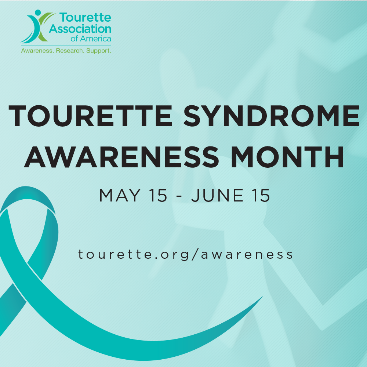
Tourette syndrome: Behavioral treatmentfor tics that works |
|---|

May 15-June 15 is Tourette Syndrome awareness month.
Tourette syndrome is a public health concern. A decade ago, a promising behavior therapy option for tic disorders was developed, called Comprehensive Behavioral Intervention for Tics (CBIT).
Because CBIT was new, and families needed access, CDC partnered with the Tourette Association of America to provide CBIT training for health professionals and educational programs about CBIT for people who have Tourette syndrome and their families. In the past decade, the partnership supported 120 CBIT programs with about 3,700 attendees. The Tourette Association of America has also supported 33 training institutes for CBIT, with close to 300 practitioners becoming licensed to provide CBIT to their patients. Read more about CBIT.

The Tourette Association of America provides education resources and works to improve awareness of TS among professional audiences, families, individuals, and the public. Their local Tourette Association chapters help connect families and offer support for living with Tourette and other tic disorders.
New study:
Children with Tourette syndrome are more likely to struggle with social competence, particularly when they have moderate to severe Tourette syndrome and when they are diagnosed with other mental, emotional, or behavioral disorders.
Bitsko RH, Danielson ML, Leeb RT, Bergland B, Fuoco MJ, Ghandour RM, Lewin AB. Indicators of Social Competence and Social Participation Among US Children With Tourette Syndrome. Journal of Child Neurology. Published online June 9, 2020
Earned Income Tax Credit (EITC): Promoting Children’s Mental Health
Strong evidence links income and health, especially poverty and poor health. When working families struggle to make ends meet on low wages, that can lead to poor health outcomes such as increased risk for disease and premature death. For some working families, there is an intervention: the Earned Income Tax Credit (EITC).
The Centers for Disease Control & Prevention (CDC) has identified EITCs as one of 14 key evidence-based interventions that can improve health in five years or less and has been shown to be cost effective. A review of the evidence showed that direct health benefits include improved infant and maternal health, such as increased birth weight and reduced risk for death and poor childhood health.
Benefits also include children’s mental health: Children in families receiving the EITC showed fewer behavioral health problems, including anxiety and depression. EITCs are one of the best public health interventions available, and public health can play a key role increasing EITC availability, size, and participation.
Learn more: Earned Income Tax Credit Public Health Action Guide
Did you know? Census 2020 – everyone counts, including babies and young children. Help make them count!
The 2020 Census is underway. Babies and young children are often missed in the census. Not counting newborn babies and children impacts support for programs such as children’s health insurance, hospitals, child care, food assistance, schools, and early childhood development. The CDC uses census information to better understand children’s development and health, including children’s mental health.
Please share with partner organizations and especially with families that it is important to count all the babies and children in their home, even if they aren’t related to the family or are only staying with them temporarily. Learn more at 2020CENSUS.GOV.
Census partners are vital to ensuring a complete and accurate count. As trusted voices in your communities, you play a key role in raising awareness that the 2020 Census is easy, safe, and important. Become a census partner.
If you have not yet participated yourself: Count everyone in your home on the 2020 Census. That includes babies, young children, foster children, and nonrelatives who live with you. The census will shape the future for communities across the nation. Respond today at 2020CENSUS.GOV
COVID-19 Information
The following are CDC resources related to COVID-19 that may be of interest to the communities and populations working with children. For the latest and most comprehensive information on COVID-19 from CDC, visit Coronavirus Disease 2019
Information Specific to Children
Videos for Parents
- ASL Video Series: Tips to Keep Children Healthy While School is Out in American Sign Language
- COVID_19: Parents Supporting children
Websites and Mailing Lists to Learn More
- What’s New? Features a running list of web pages that have been updated
- Subscribe for updates from CDC’s COVID-19 Response
- Join the COCA Mailing List for updates on upcoming Clinical Outreach and Communication Activity (COCA) Calls





















.png)












No hay comentarios:
Publicar un comentario